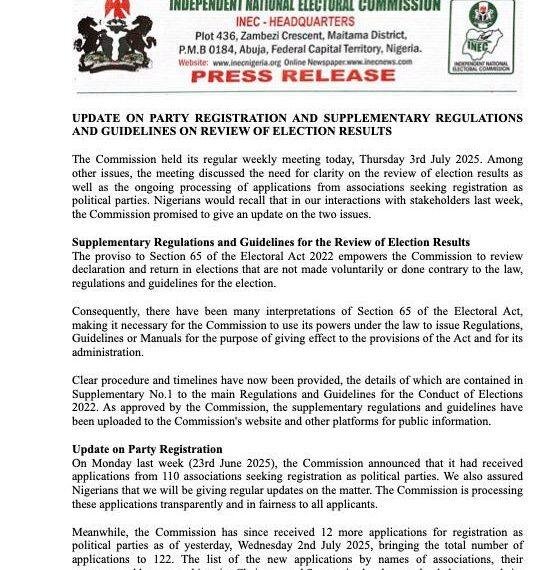The Independent National Electoral Commission (INEC) has announced new rules and guidelines to help clarify how election results are reviewed in Nigeria. These updates are important for understanding the process and deadlines for checking results that were not announced properly.
A National Commissioner with INEC, Mr. Sam Olumekun, shared this information in a statement in Abuja.
He stated that these new guidelines were approved during a commission meeting on Thursday. A key focus of the meeting was to address the need for more straightforward rules about reviewing election results, along with ongoing applications from groups wanting to register as political parties.
According to the law, the commission has the authority to review results that were declared improperly or not in line with the established rules. This has led to varied interpretations of the law, making it necessary for INEC to provide clearer guidelines to ensure fair administration of elections.
The new guidelines provide specific steps and timelines for the review process, and they are now available on INEC’s website and other platforms for everyone to access.
Read also:
- ADP chairman advocates stripping president of power to appoint INEC chairman, RECs
- INEC to deploy over 30,000 officials for nationwide bye-elections
- INEC confirms receipt of 110 applications for political party registration
Additionally, Olumekun revealed that the commission has received 12 more applications from groups looking to register as new political parties. This brings the total number of applications to 122, following an earlier announcement in June when INEC had reported 110 applications.
He emphasized that INEC is committed to keeping the public informed about the registration process and will evaluate the applications with fairness and transparency. Details about the new applicants, including their names, addresses, and leadership members, have also been shared online.
To help speed up the review of these applications, Olumekun urged the groups to keep their proposed leadership and address details consistent, avoiding any changes that might delay their registration process.






